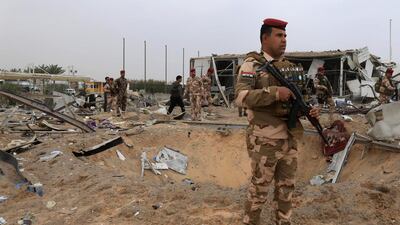The US military abandoned a base in western Iraq this week to reduce exposure to a war of attrition waged by militia supported by Iran to drive out US troops.
With elections in November and the spread of coronavirus in the US, Washington has found little answer to attacks it blames on some of the most ideologically driven Iraqi militias allied with Iran.
The US military announced that on Tuesday it handed over Al Qaim base, near the Syrian border, to the Iraqi military.
The US military sought to play down the effect of the transfer, saying the Iraqi military is qualified to keep defeated ISIS elements out of the area on its own.
A US officer said that in the war against ISIS the base served as a "critical location" for the US-led coalition involved in Operation Inherent Resolve.
Forces "will relocate and consolidate personnel and equipment from several Iraqi bases throughout 2020", Brig Gen Vincent Barker said.
Attacks against American troops in Iraq picked up in the past two weeks, furthering Iran's goals of driving US forces out of Iraq. The rise of ISIS drew US troops back into Iraq in 2014.
On Wednesday, several days after US personnel were wounded in a rocket attack on a base north of Baghdad, Pentagon spokesman Jonathan Hoffman said "we still are looking at how we may respond to any type of attack" on US forces.
Despite proximity to Iranian operatives and its militia clients in Iraq, US forces stayed out of direct confrontation with Iran.
This changed when a US drone strike killed Qassem Suleimani, head of Iran's Quds Force, on January 3.
Abdulwahab Badrakhan, a Lebanese political commentator, said Iran appeared to be confident the US would not repeat another attack specifically against Iranian targets.
A direct attack on Iran could harm US President Donald Trump's re-election chances, with his Democratic opponents set to portray it as an attempt to deflect from the political fallout of the coronavirus outbreak in the US, Mr Badrakhan said.
"The militias are being hit hard each time the US retaliates, but their threshold for pain is high," he said.
Iran appears to believe the US will retreat this year to regions controlled by its Iraqi Kurdish allies in the north, he said.
"Iran will still not be able to own the Iraqi theatre," he said.
He pointed to Shiite discontent with the management of the state and Sunni communities who see the US as a practical ally after what they see as mass deportations and atrocities by Shiite militias.
The domestic overreach of Iran's militia allies was highlighted last week by the US strike against a suspected militia weapons factory in Jurf Al Sakhr, a town south of Baghdad.
Kataib Hezbollah, a militia the US accuses of mounting recent attacks on US troops, emptied Jurf Al Sakhr of its Sunni inhabitants during the war with ISIS in 2014.


